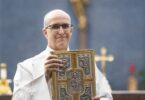
Leon Suprenant is the pastoral associate for administration in the office of the permanent diaconate. He also blogs at: www.archkck.org/blog.
by Leon Suprenant
One of the best-kept secrets in the archdiocese is the development and growth of the permanent diaconate in northeast Kansas over the past 10 years.
Since Archbishop Keleher first gave the go-ahead to establish the diaconate here, we have had three classes, or “cohorts,” of men step forward and enter our diaconate program.
We call them “cohorts” because a cohort is a group united in a common cause. In this case, the men are united in their openness and desire to serve the church as ordained ministers.
We ordained 17 men from the first cohort in April 2011. They will be celebrating their fifth anniversary as deacons this year! We also have nine deacons who were ordained in other dioceses now serving at least part time as deacons here in the Archdiocese of Kansas City in Kansas.
Our second cohort was formed in 2012. There are presently 18 men in that cohort. Their ordination is scheduled for June 2017.
More recently, we formed a third cohort that is being trained concurrently with the second cohort. There are 21 men in the third cohort, and, God willing, their ordination will take place sometime in 2020.
I guess you can say that when it comes to the diaconate in Kansas City, we are going from zero to 60 in about a decade!
As is the case with the priesthood, the diaconate requires several years of training, involving human, spiritual, academic and pastoral formation.
Whereas priests’ formation is necessarily more intensive, involving full-time residence at a seminary, diaconal training is done within the context of family life (all 39 men currently in the program are married) and work (most have full-time jobs). For that reason, much of the formation is provided during intensive weekend trainings held on a monthly basis at Savior Pastoral Center in Kansas City, Kansas.
During these weekends, candidates for the diaconate take a wide range of theology courses, from Scripture and liturgy to canon law and Catholic social teaching. They also receive intensive spiritual formation, including Holy Hours, retreats and teachings on meditative prayer and the Liturgy of the Hours.
Some courses, such as training to give homilies, don’t “fit” in the regular rotation of weekend sessions and are taken during the summers.
All of the men who are preparing to become deacons are given different pastoral assignments each year, including parish work, Catholic Charities, prison ministry and hospital ministry. These types of ministries are at the heart of the unique mission of the deacon to enflesh the church’s call to imitate Christ the servant.
Integrating diaconal formation into one’s life requires much generosity and discipline — not to mention a supportive spouse and children and, at times, flexible employers! Please support these men with your prayers.

